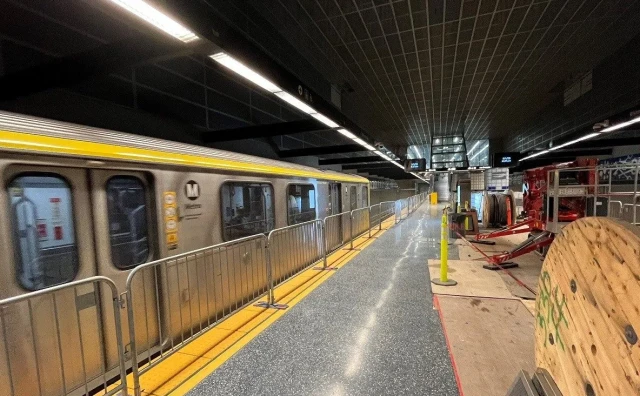With our free press under threat and federal funding for public media gone, your support matters more than ever. Help keep the LAist newsroom strong, become a monthly member or increase your support today during our fall member drive.
'Emerald City Nights' revisits jazz pianist Ahmad Jamal in a series from the 1960s
TERRY GROSS, HOST:
This is FRESH AIR. Jazz pianist Ahmad Jamal, who's 92 now, has signed off on a new series of live recordings from a Seattle club he'd played in the 1960s. Two volumes are now out. Jazz critic Kevin Whitehead prefers the peppy Volume 1.
(SOUNDBITE OF AHMAD JAMAL'S "MINOR MOODS")
KEVIN WHITEHEAD, BYLINE: Ahmad Jamal, 1964. A decade earlier, the pianist led a popular trio with bass and guitar, which made dramatic use of dynamics, contrasts between loud and soft. They play lightly and politely, but punctuated with exclamatory gestures. The music was spry and clever and sometimes a little dainty. So Jamal traded in guitar for drums. They'd still tread lightly, but drums made those big change-ups bigger.
(SOUNDBITE OF AHMAD JAMAL'S "KEEP ON KEEPING ON")
WHITEHEAD: Ahmad Jamal thought like a small group orchestrator in his solos as well. He'd get louder or softer, leaner or denser, breaking up brisk improvised lines with emphatic chords, even at quick tempos. This is "Squatty Roo."
(SOUNDBITE OF AHMAD JAMAL'S "SQUATTY ROO")
WHITEHEAD: Ahmad Jamal with drummer Chuck Lampkin and bassist Richard Evans from "Emerald City Nights: Live At The Penthouse 1963-1964." It's the first of three newly excavated surveys of Jamal trios recorded in Seattle. Ahmad Jamal grew up in Pittsburgh, a wellspring of jazz pianists going back to Earl Hines and Mary Lou Williams. But Jamal's trio concepts came together while living in Chicago, and he can lay back behind the beat like one of the homegrown locals, sounding relaxed while staying busy. Jamil Nasser is on bass here and on most of the album.
(SOUNDBITE OF AHMAD JAMAL'S "TANGERINE")
WHITEHEAD: The early 1960s was a tumultuous time in jazz, and Jamal kept up with some wide open modal harmony and expansive McCoy Tyner chords. He might also use small, fragmentary figures as building blocks like an avant garde pianist. For instance, midway through the modal romp "Bogota," he hits on a little descending run and teases it a bit before wandering away.
(SOUNDBITE OF AHMAD JAMAL'S "BOGOTA")
WHITEHEAD: That little dipping phrase sounds like a throwaway till he picks it back up more than a minute later before dropping it again. But when Jamal circles back for a third go-round, drummer Chuck Lampkin propels it to center stage.
(SOUNDBITE OF AHMAD JAMAL'S "BOGOTA")
WHITEHEAD: Ahmad Jamal plays a lot of piano on the first volume in his "Emerald City Nights" series of unheard 1960s music. He trots out bright tremolo chords and witty quotations from old tunes and other fleet-fingered pianists. The trio do a couple of waltzes, including a lilting "Lollipops And Roses." With tracks averaging eight or nine minutes, they stretch out, but don't overdo it. At Seattle's Penthouse, Jamal's trios came to play with muscle and subtlety and big ears.
(SOUNDBITE OF AHMAD JAMAL'S "LOLLIPOPS AND ROSES")
GROSS: Kevin Whitehead is the author of the book "Play The Way You Feel: The Essential Guide To Jazz Stories On Film." He reviewed "Emerald City Nights: Live At The Penthouse 1963 to '64," live recordings by Ahmad Jamal released for the first time. The new series "Kindred," about a woman in L.A. transported back in time to a pre-Civil War plantation, is adapted from a novel by the pioneering Black feminist science fiction writer Octavia Butler. Tomorrow on FRESH AIR, we'll listen back to an interview with Butler from our archive. We'll also feature an interview from our archive with Marijane Meaker, a pioneering writer of lesbian fiction in the 1950s. She also wrote a memoir about her two-year relationship with novelist Patricia Highsmith, author of "The Talented Mr. Ripley" and "Strangers On A Train," which were adapted into films. Meaker died last month. I hope you'll join us. I'm Terry Gross. Transcript provided by NPR, Copyright NPR.
At LAist, we believe in journalism without censorship and the right of a free press to speak truth to those in power. Our hard-hitting watchdog reporting on local government, climate, and the ongoing housing and homelessness crisis is trustworthy, independent and freely accessible to everyone thanks to the support of readers like you.
But the game has changed: Congress voted to eliminate funding for public media across the country. Here at LAist that means a loss of $1.7 million in our budget every year. We want to assure you that despite growing threats to free press and free speech, LAist will remain a voice you know and trust. Speaking frankly, the amount of reader support we receive will help determine how strong of a newsroom we are going forward to cover the important news in our community.
We’re asking you to stand up for independent reporting that will not be silenced. With more individuals like you supporting this public service, we can continue to provide essential coverage for Southern Californians that you can’t find anywhere else. Become a monthly member today to help sustain this mission.
Thank you for your generous support and belief in the value of independent news.

-
Restaurants share resources in the food hall in West Adams as Los Angeles reckons with increasing restaurant closures.
-
It will be the second national day of protest against President Donald Trump.
-
The university says the compact, as the Trump administration called it, could undermine free inquiry and academic excellence.
-
This is the one time you can do this legally!
-
Metro officials said it will be able to announce an opening date “soon.”
-
While working for the county, the DA’s office alleges that 13 employees fraudulently filed for unemployment, claiming to earn less than $600 a week.







